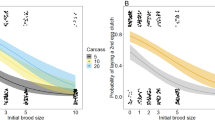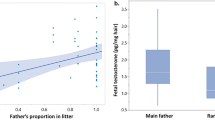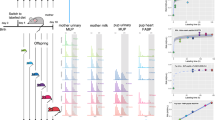Abstract
Asymmetries in the costs and benefits of parental investment for mothers, fathers and offspring result in family conflict over the production and provisioning of young1,2,3. In species where females provide most resources before and after birth, the resolution of this conflict may be influenced by genes expressed in mothers and by maternally and paternally inherited genes expressed in offspring4,5. Here we disentangle these effects by means of reciprocal mating and cross-fostering of litters between two strains of mice that differ with respect to the typical resolution of family conflict. We find that differences in litter size between these two strains are determined by paternal genotype, whereas differences in provisioning are under maternal control, showing that there is antagonistic coadaptation of maternal and paternal effects on distinct life-history traits. Maternal provisioning is also influenced by the type of foster offspring. Contradictory to theoretical expectations, however, we find no evidence for a negative correlation across strains between maternal provisioning and offspring demand. Instead, we show that there is positive coadaptation such that offspring obtain more resources from foster mothers of the same strain as their natural mother, irrespective of their father's strain.
This is a preview of subscription content, access via your institution
Access options
Subscribe to this journal
Receive 51 print issues and online access
$199.00 per year
only $3.90 per issue
Buy this article
- Purchase on Springer Link
- Instant access to full article PDF
Prices may be subject to local taxes which are calculated during checkout



Similar content being viewed by others
References
Trivers, R. L. Parent–offspring conflict. Am. Zool. 14, 249–264 (1974)
Godfray, H. C. J. Evolutionary theory of parent–offspring conflict. Nature 376, 133–138 (1995)
Parker, G. A., Royle, N. J. & Hartley, I. R. Intrafamilial conflict and parental investment: a synthesis. Phil. Trans. R. Soc. Lond. B 357, 295–307 (2002)
Agrawal, A. F., Brodie, E. D. & Brown, J. Parent–offspring coadaptation and the dual genetic control of maternal care. Science 292, 1710–1712 (2001)
Haig, D. Parental antagonism, relatedness asymmetries, and genomic imprinting. Proc. R. Soc. Lond. B. 264, 1657–1661 (1997)
Trivers, R. L. Sexual Selection and the Descent of Man (ed. Campbell, B.) 139–179 (Aldine, Chicago, 1972)
MacNair, M. R. & Parker, G. A. Models of parent–offspring conflict II. Promiscuity. Anim. Behav. 26, 111–122 (1978)
Lessells, C. M. Parentally biased favouritism: why should parents specialise in caring for different offspring. Phil. Trans. R. Soc. Lond. B 357, 381–403 (2002)
Houston, A. I. & Davies, N. B. Behavioural Ecology (eds Sibley, R. M. & Smith, R. H.) 471–487 (Blackwell Scientific, Oxford, 1985)
Li, L. L. et al. Regulation of maternal behaviour and offspring growth by paternally expressed Peg3. Science 284, 330–333 (1999)
Keverne, E. B. Genomic imprinting, maternal care, and brain evolution. Horm. Behav. 40, 146–155 (2001)
Kölliker, M. & Richner, H. Parent–offspring conflict and the genetics of offspring solicitation and parental response. Anim. Behav. 62, 395–407 (2001)
Fuchs, S. Optimality of parental investment: The influence of nursing on reproductive success of mother and female young house mice. Behav. Ecol. Sociobiol. 10, 39–51 (1982)
Clutton-Brock, T. H. The Evolution of Parental Care (Princeton Univ. Press, Princeton, 1991)
Cowley, D. et al. The impact of maternal uterine genotype on postnatal growth and adult body size in mice. Genetics 122, 193–203 (1989)
Wolf, J. B. & Brodie, E. D. The coadaptation of parental and offspring characters. Evolution 52, 299–308 (1998)
Wolf, J. B. Gene interactions from maternal effects. Evolution 54, 1882–1898 (2000)
König, B. Cooperative care of young in mammals. Naturwissenschaften 84, 95–104 (1997)
Acknowledgements
We thank R. Bshary, T. Coulson, B. Keverne, R. Kilner and S. Rands for comments and discussion. R.H. is supported by the Department of Zoology and Trinity College, Cambridge and The German Academic Exchange Service.
Author information
Authors and Affiliations
Corresponding author
Ethics declarations
Competing interests
The authors declare that they have no competing financial interests.
Rights and permissions
About this article
Cite this article
Hager, R., Johnstone, R. The genetic basis of family conflict resolution in mice. Nature 421, 533–535 (2003). https://doi.org/10.1038/nature01239
Received:
Accepted:
Issue Date:
DOI: https://doi.org/10.1038/nature01239
This article is cited by
-
Post-natal imprinting: evidence from marsupials
Heredity (2014)
-
Cross-fostering mismatches parent-offspring behaviors but this does not entail costs to family life
Behavioral Ecology and Sociobiology (2014)
-
On the coadaptation of offspring begging and parental supply—a within-individual approach across life stages
Behavioral Ecology and Sociobiology (2014)
-
Effects of breastfeeding on body composition and maturational tempo in the rat
BMC Medicine (2013)
-
Why do female mice mate with multiple males?
Behavioral Ecology and Sociobiology (2013)
Comments
By submitting a comment you agree to abide by our Terms and Community Guidelines. If you find something abusive or that does not comply with our terms or guidelines please flag it as inappropriate.



